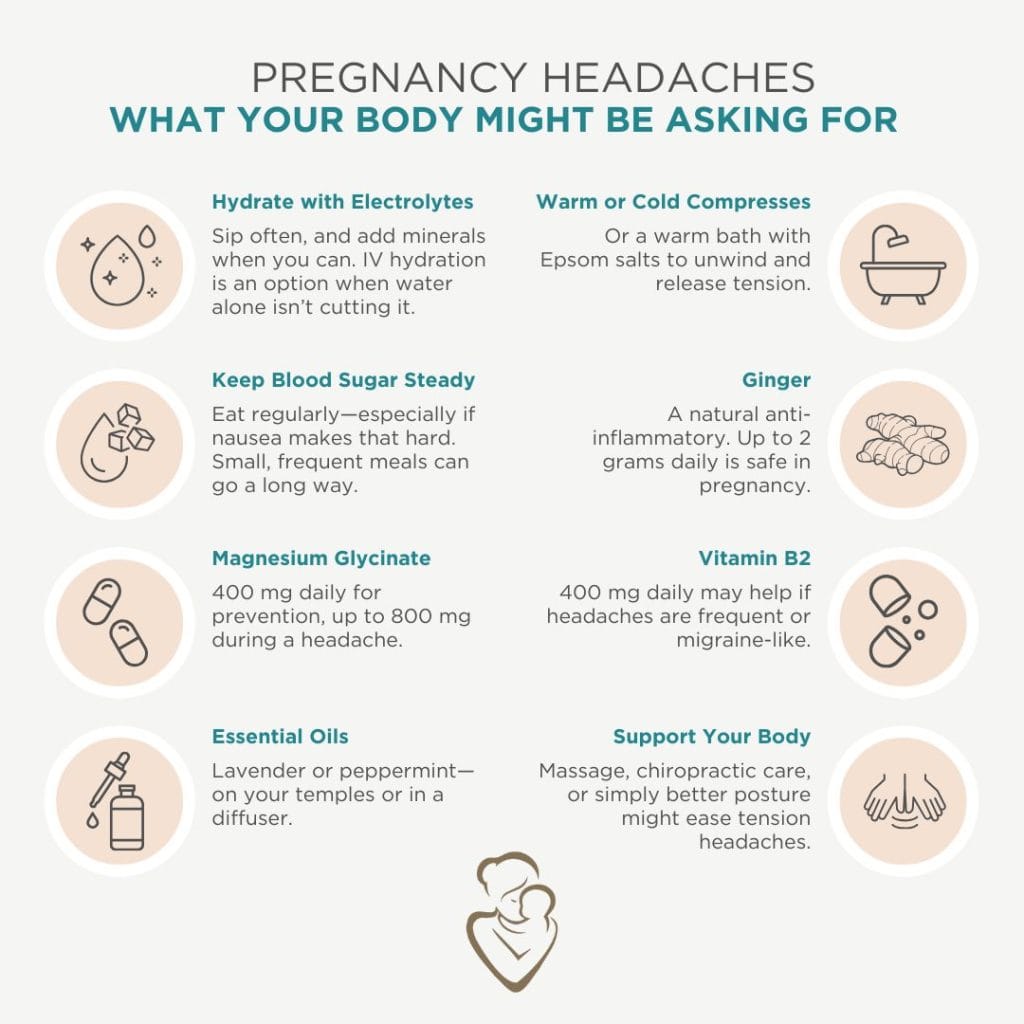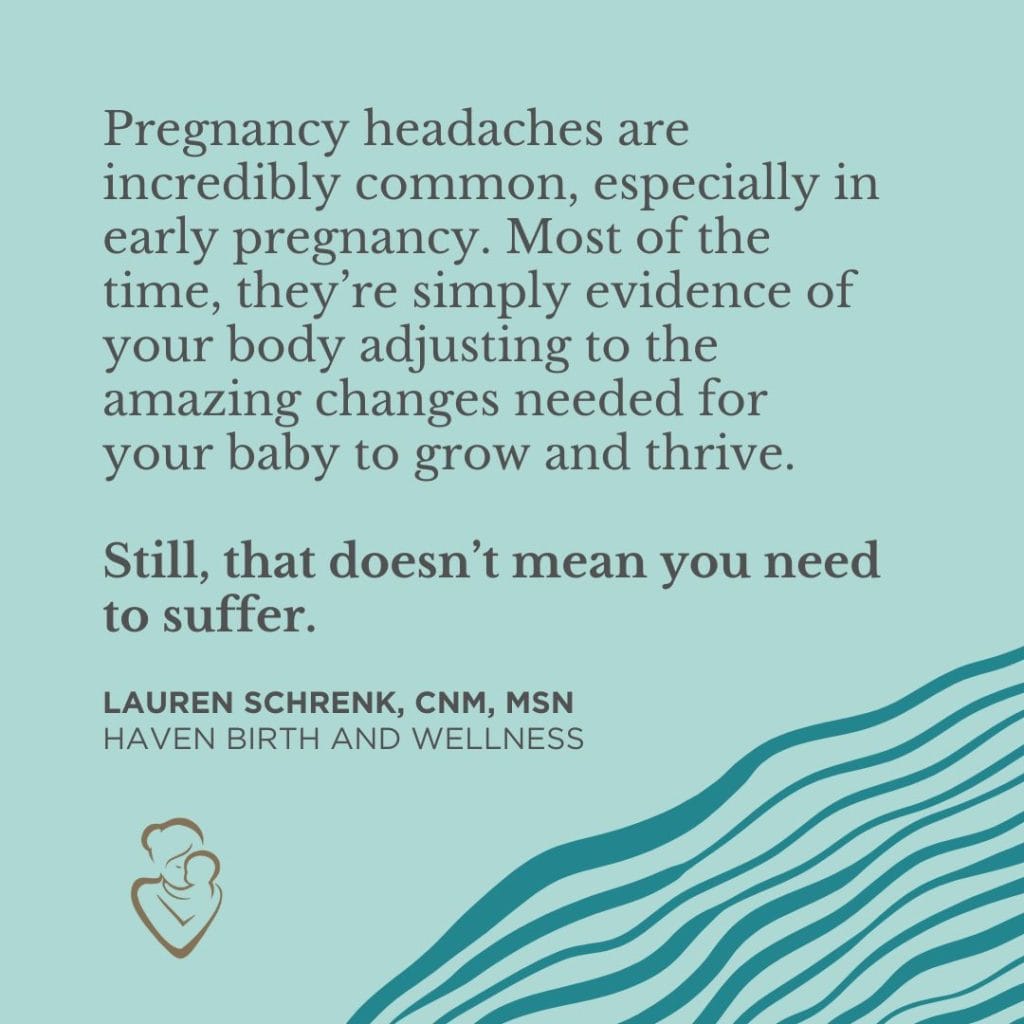

If you’ve noticed an uptick in headaches during pregnancy, you’re not alone. As certified nurse-midwives, we hear from moms experiencing pregnancy headaches almost every week.
The good news is that, though disruptive, pregnancy headaches aren’t usually cause for concern, and many even respond well to natural pain-relief approaches.
Let’s talk about why pregnancy headaches tend to show up, how to treat (or prevent!) them, and which symptoms merit a deeper look.
What Causes Pregnancy Headaches?
Headaches in pregnancy are most common during the first trimester, often due to hormonal changes and/or the natural increase in blood volume during this time. These shifts can trigger headaches in ways that feel frustrating, especially if you’ve never been prone to headaches before.
You might also experience pregnancy headaches from lifestyle changes or adjustments in your daily routine. If you stopped drinking coffee when you found out you were pregnant, for example, the caffeine detox can cause surprisingly painful headaches. Other common triggers include:
- Dehydration
- Blood sugar issues
- Lack of sleep
Even later in pregnancy, headaches may still occur due to increased swelling in the body. Less commonly, later headaches may signal something more serious, like high blood pressure issues, which I’ll talk more about below.

Headaches in Pregnancy: What Helps and What Doesn’t
As midwives, we lean on quite a few gentle, natural tools to help manage pregnancy headaches and even prevent them from coming on in the first place.
Make Hydration a Priority
Staying hydrated, especially with electrolytes, is a big one. We offer IV hydration here at Haven, which can be incredibly helpful if you’re having trouble drinking enough on your own or feel depleted. We’ve chosen several high-quality electrolyte powders to have available in the clinic for purchase as well.
Balance Your Blood Sugar
Eating regularly to avoid big blood sugar swings is another simple but powerful support. Skipping meals or going too long without food can really trigger headaches for some people.
If you’re struggling with morning sickness, natural nausea remedies may be helpful here. However, don’t hesitate to contact your midwife or provider for support if your nausea becomes severe.
Take Magnesium Glycinate
Magnesium is one of my go-to suggestions when a client tells me they’re having pregnancy headaches. I typically recommend 400 mg of magnesium glycinate daily for prevention. If you’re in the middle of a headache, you can safely take up to 800 mg for relief.
Use Essential Oils
Lavender and peppermint oils can be very soothing for headaches. You can dab them on your temples or the site of your headache, or use them in a diffuser.
Try Warm or Cold
Some women find relief from warm or cold compresses on their heads. It’s worth experimenting to see what feels best for your body. A warm bath with 1–2 cups of Epsom salt is another great option, especially at the end of a long day.
Consider Ginger
Ginger is a natural anti-inflammatory that’s safe to use in pregnancy. You can take up to 2 grams daily in capsule form, especially if you feel a headache coming on. We have Pure Synergy ginger capsules available for purchase in the clinic, or you can find them here on Amazon.
Take Vitamin B2
For clients dealing with frequent headaches or migraines, I often suggest adding 400 mg of vitamin B2 (riboflavin) to their daily routine for prevention.
Soothe Tension Headaches
If you have tension-related headaches, it’s worth thinking about chiropractic care or massage.
Remember to try to support your body alignment well, especially as your center of gravity shifts. Something as simple as poor posture or an awkward sleeping position could trigger a tension headache.
Headaches in Pregnancy: Safe Medications for Pain
Certain over-the-counter medications are safe and may offer relief if you don’t get adequate help from natural approaches.
If you’re struggling to sleep with an intense headache, 25 mg of Benadryl may ease both the pain and the restlessness.
As far as pain relievers, we do not recommend Tylenol (acetaminophen) during pregnancy. Instead, we encourage you to check in with your midwife or provider about alternative options that may be more appropriate for you and your baby.
It’s also important to know that ibuprofen is not safe in pregnancy. Ibuprofen has been linked to complications like low amniotic fluid, heart defects, kidney and lung development issues, and — rarely — gastroschisis in babies. For these reasons, we always recommend steering clear of ibuprofen in pregnancy.
When Are Pregnancy Headaches a Concern?
While most pregnancy headaches are completely benign, we watch for signs that tell us something more might be going on.
If you experience a severe, unrelenting headache after 20 weeks of pregnancy, that’s something we need to investigate further. We especially want to know about other accompanying symptoms, such as:
- Vision changes
- Sudden swelling
- Abdominal pain
- Increased blood pressure
These may be signs of preeclampsia, which typically only develops after the 20-week mark. Regardless, if you’re not feeling well and symptoms aren’t improving, we always encourage you to reach out for support.

Pregnancy Headaches: Final Thoughts
Remember, pregnancy headaches are incredibly common, especially in early pregnancy. Most of the time, they’re simply evidence of your body adjusting to the amazing changes needed for your baby to grow and thrive.
Still, that doesn’t mean you need to suffer. Try the supportive measures we’ve talked about, stay in tune with how your body’s feeling and any new symptoms, and know that we’re here to help if things aren’t improving.
Your comfort and well-being matter. With a little care and attention, we can usually ease pregnancy headaches — so you can get back to focusing on all the beauty and joy this season brings.

Lauren Schrenk is a midwife at Haven Birth & Wellness, dedicated to providing holistic, community-based care. With a deep passion for women’s health and natural birth, Lauren focuses on empowering women through informed choices and personalized care. She is excited to be part of Haven's mission to support families during such pivotal moments in their lives.
Originally from Georgia, Lauren now lives in Nashville with her husband, golden doodle, and their sweet daughter. Outside of midwifery, Lauren enjoys hiking, camping, traveling, and exploring Nashville’s vibrant community.
